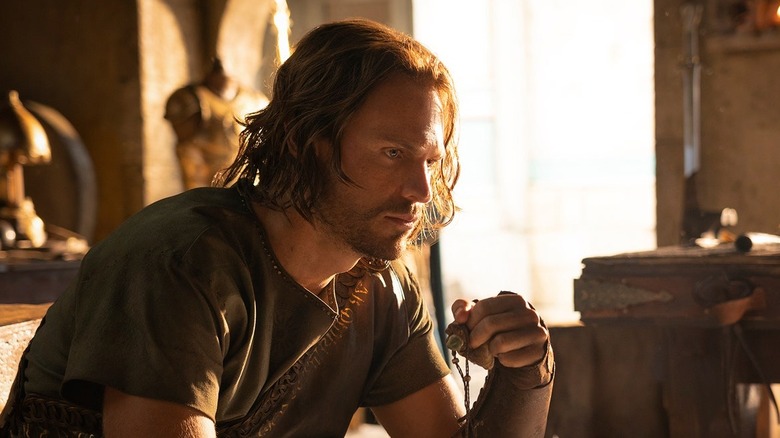This Is The Lord Of The Rings: The Rings Of Power's Biggest Departure From Tolkien's Novels
Nostalgia is about to hit fans of "The Lord of the Rings" like a spring storm with the much-anticipated debut of the Amazon series, "The Rings of Power." This particular adaptation will not be focusing on a particular J. R. R. Tolkien novel, but rather be offering a vast, extensive look into the many backstories that bolster the "Lord of the Rings" trilogy, as well as the other novels. An exclusive report by Vanity Fair talks at length about the various processes behind the creation of Tolkien's complex, intricate world, along with how "The Rings of Power" carves out its own identity by making one of the biggest departures from Tolkien's novels. "The Rings of Power" will be forming its own temporal timeline that is much different from the books — while this is a bold move, it is a necessary one, given the creative and practical reasons that justify it.
Shadows of the Past
The Second Age is a seminal time period within the narrative ambit of "The Lord of the Rings," as this stretch of time lasted for roughly 3,441 years and ended with the defeat of Sauron and his army, a century after the Downfall of Númenor. Of course, it's important to note that the One Ring was forged, or rather, came into existence during this period, hence making it a critical rite of passage from a temporal perspective. As "The Rings of Power" is set during the Second Age, well before the events of "The Hobbit" and "The Lord of the Rings" trilogies, the presence of Sauron will be more of a flicker of danger as opposed to a full-fledged ring of fire, let alone an all-seeing eye atop his tower in Barad-dûr.
J.A. Bayona ("Jurassic World: the Fallen Kingdom"), who directed the first two episodes of the new series, likened Sauron's lingering presence in Middle-earth to his memories of growing up in Spain amidst a socio-political environment still recovering from a civil war. These lingering repercussions, which is aptly named "Shadow of the Past" (also the name of the first episode), will be incorporated into the very framework of the narrative, such as Galadriel's intuition that something dark is "lurking" amidst the light.
In Tolkien's novels, these events span thousands of years, but the showrunners have compressed these eon-spanning events into a single point in time. Why? Writers D Payne & Patrick McKay explain this greatest deviation and the risks that accompany the same:
"We talked with the Tolkien estate ... If you are true to the exact letter of the law, you are going to be telling a story in which your human characters are dying off every season because you're jumping 200 years in time, and then you're not meeting really big, important canon characters until season four. Look, there might be some fans who want us to do a documentary of Middle-earth, but we're going to tell one story that unites all these things."
This creative risk is understandable, as making a 50-hour adaptation of one of the most well-loved and respected texts in the history of literature is a task that is daunting enough, and some adjustments need to be made to make the narrative tighter, more cohesive. Payne and McKay are aware of the potential for critical fan speculation/backlash, and only have the sincerity of their endeavor to offer, as they hope that "the work will eventually speak for itself."
The first eight-episode season of "The Rings of Power" is scheduled to premiere on Prime Video on September 2, 2022.

